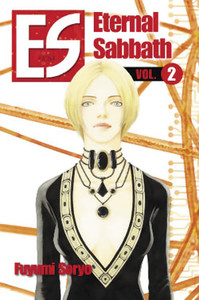Review
by Carl Kimlinger,ES (Eternal Sabbath)
G.novel 2
| Synopsis: |  |
||
Sakaki reveals to Mine the whole truth surrounding Shura/Akiba and his younger "sibling", the psychopathic Isaac. The horror of his tale drives home the terrifying extent of Isaac and Shura's powers, and Mine agrees to help Sakaki track down and destroy Isaac. Shura refuses to get involved, leaving the two to face the menace alone. They are able to resist Isaac's telepathic advances, and they even have a lead in the form of a young girl named Yuri, but will it be enough? As the body count increases precipitously, it becomes increasingly obvious that it isn't, but the only person capable of taking on Isaac is also the one person who seems most indifferent to the affairs of humans. |
|||
| Review: | |||
Fuyumi Sōryō'S.E.S. is one of a growing number of manga on the English language market that focus more on psychological than physical or emotional thrills. If ES is any indication, it's a trend that should be encouraged. ES is a dark, creepy, full course psychological horror meal for thinking manga consumers. Volume 2, after clearing up the origins of Shura and Isaac, expends its considerable page count detailing the first stages of what promises to be a long battle between Mine, Sakaki, and Isaac. The confrontation is simultaneously intense, frightening and, on occasion, deeply disturbing. Soryo's writing excels at psychological realism, and this volume features a few spectacular moments of insight. The audience gets a brief, telling glimpse of Isaac's home life; Mine makes an awful, yet fully understandable decision; Shura discusses his view of humanity. Most impressive, however, is Soryo's portrayal of the amorality of children. Isaac's psychosis comes not from some inherent evil, but rather from his inability to temper his power with any moral force or conviction. He is nothing more than an enormous force of nature given intelligence enough to wield his power, yet lacking any motivations other than all-consuming self-interest and an utter lack of respect for life. As frightening as that is, perhaps even more frightening are the scenes in which Yuri explains her dealings with Isaac. The answers her young mind comes up with to deal with the problem of comprehending Isaac's actions are more frightening than any genetically engineered monster could ever be. It's not all psychological however; Soryo also sneaks in some punch-to-the-gut horror moments. A telepathically controlled massacre is portrayed in clinical detail, and a scene in which three boys happily attack their friend at Isaac's bidding is so unpleasant as to be virtually unreadable. Heck, there's even some gunplay to liven things up a bit. And just when things seem grimmest, Soryo introduces a dash of humor to lighten the proceedings, continues to skillfully play the unyielding clash of intelligences between Shura and Mine, and tops it all off with—dare I say it?—a brief glimmer of romance. Much like the content (which at times eerily echoes the film Cure), Soryo's art resembles nothing so much as the spare, minimalist compositions of horror film maestro Kiyoshi Kurosawa. Her use of blank white backgrounds and open space give even the bursts of gory violence a distant, sterile feel. Characters are drawn with fine, yet bold lines, giving them a well-defined appearance. Designs lean towards the realistic; even the most attractive of characters (Mine and Shura top the list) are believably so. Important emotions are effectively communicated with little more than a repeated panel and a subtle change in expression. However, what is most reminiscent of Kurosawa is the manner in which Soryo's stodgy rectangular paneling imparts a tricky sense of straightforward continuity and solid perspective that obscures just how much is hidden or left out, until the moment arrives when Soryo reveals what lies outside their boundaries, outside their heads; when she reveals what it is that's really happening. The resulting sense of insecurity and uncertainty is the greatest friend any horror storyteller could ever desire. Del Rey does their usual fine job of binding and printing the book. Sound effects are left intact with a small translation next to them. Extras with this volume are a few scant translation notes, and a virtually wordless untranslated preview of volume three. ES may not have epic battles, slews of beautiful women, or angst-ridden romance, but it does have exceptional insight into its cast of well-rounded characters, a chilling premise, and more brains and guts than almost any other half a dozen manga. And best of all, it's damn creepy. Shura says to read it, and you will obey. |
|
The views and opinions expressed in this article are solely those of the author(s) and do not necessarily represent the views of Anime News Network, its employees, owners, or sponsors.
|
| Grade: | |||
Overall : A
Story : A
Art : A-
+ Extraordinary psychological depth; creepy as hell. |
|||
| discuss this in the forum (21 posts) | | |||
| Production Info: | ||
|
Full encyclopedia details about Release information about |
||